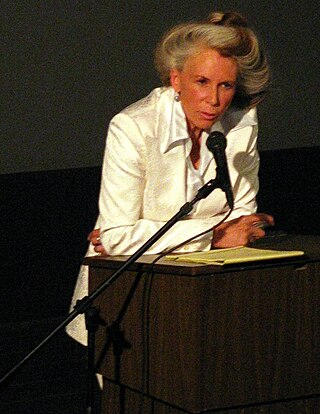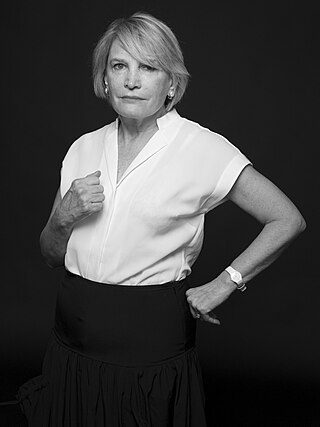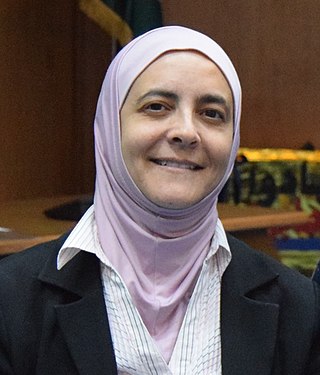
Radcliffe College was a women's liberal arts college in Cambridge, Massachusetts, that was founded in 1879. In 1999, it was fully incorporated into Harvard College.
Amina Lawal Kurami is a Nigerian woman sentenced to death by stoning for adultery and for conceiving a child out of wedlock. Lawal was sentenced by an Islamic Sharia court in Funtua, in the northern state of Katsina, in Nigeria, on 22 March 2002. The person she identified as the father of the child, Yahayya Muhammad Kurami, was acquitted of the accusation of zinā. Although Kurami was excused because he took an oath by the Holy Qur’an, this was not an option for Lawal due to the presence of her child, which is proof in the Mālikī school.

Shirin Ebadi is an Iranian Nobel laureate, lawyer, writer, teacher and a former judge and founder of the Defenders of Human Rights Center in Iran. In 2003, Ebadi was awarded the Nobel Peace Prize for her pioneering efforts for democracy and women's, children's, and refugee rights. She was the first Muslim woman and the first Iranian to receive the award.

Catharine Alice MacKinnon is an American feminist legal scholar, activist, and author. She is the Elizabeth A. Long Professor of Law at the University of Michigan Law School, where she has been tenured since 1990, and the James Barr Ames Visiting Professor of Law at Harvard Law School. From 2008 to 2012, she was the special gender adviser to the Prosecutor of the International Criminal Court.

Amina Wadud is an American Muslim theologian. Wadud serves as visiting professor at Indonesian Consortium for Religious Studies and was also a visiting scholar at Starr King School for the Ministry. Wadud has written extensively on the role of women in Islam.

Sisters in Islam (SIS) is a Malaysian registered company committed to promoting the rights of women in Malaysia. Its efforts to promote the rights of Muslim women are based on the principles of equality, justice and freedom enjoined by the Quran. SIS work focuses on challenging laws and policies made in the name of Islam that discriminate against women. As such it tackles issues covered under Malaysia's Islamic family and sharia laws, such as polygamy, child marriage, moral policing, Islamic legal theory and jurisprudence, the hijab and modesty, violence against women and hudud. It is noted for its Islamic feminist research and advocacy.

Mehrangiz Kar, a human rights lawyer from Iran, is an internationally recognized writer, speaker and activist who advocates for the defense of women’s and human rights in Iran and throughout the Islamic world. A common theme in her work is the tension between Iranian law and the core principles of human rights and human dignity. She is also author of the book Crossing the Red Line, and an activist of women's rights in Iran. Born in 1944 at Ahvaz, in southern Iran, she attended the College of Law and Political Science at Teheran University. After graduating, she worked for Sazman-e Ta’min-e Ejtemaii and published over 100 articles on social and political issues.

Shadi Sadr is an Iranian lawyer, human rights advocate, essayist and journalist. She co-founded Justice for Iran (JFI) in 2010 and is the Executive Director of the NGO. She has published and lectured worldwide.

Dorothy E. Roberts is an American sociologist, law professor, and social justice advocate. She is the Penn Integrates Knowledge Professor, George A. Weiss University Professor, and inaugural Raymond Pace and Sadie Tanner Mossell Alexander Professor of Civil Rights at the University of Pennsylvania. She writes and lectures on gender, race, and class in legal issues. Her focuses include reproductive health, child welfare, and bioethics. In 2023, she was elected to the American Philosophical Society. She has published over 80 articles and essays in books and scholarly journals, including Harvard Law Review, Yale Law Journal, and Stanford Law Review.
Safiya Hussaini Tungar Tudu is a Nigerian woman condemned to death for adultery in 2002. She gave birth to a child as a single woman in Sokoto, a Nigerian state under Sharia law. She was sentenced to be stoned, but was acquitted of all charges in March 2002 after a retrial.

Saleh Nikbakht is an Iranian lawyer and academic. He is the spokesman for the Society of Political Prisoners in Iran.

Janet Benshoof was an American human rights lawyer and President and Founder of the Global Justice Center. She founded the Center for Reproductive Rights, the world's first international human rights organization focused on reproductive choice and equality.

Nasrin Sotoudeh is a human rights lawyer in Iran. She has represented imprisoned Iranian opposition activists and politicians following the disputed June 2009 Iranian presidential elections and prisoners sentenced to death for crimes committed when they were minors. Her clients have included journalist Isa Saharkhiz, Nobel Peace Prize laureate Shirin Ebadi, and Heshmat Tabarzadi. She has also represented women arrested for appearing in public without a hijab, which is a punishable offense in Iran. Nasrin Sotoudeh was the subject of Nasrin, a 2020 documentary filmed in secret in Iran about Sotoudeh's "ongoing battles for the rights of women, children and minorities." In 2021, she was named as of Time's 100 Most Influential People in the World. She was released on a medical furlough in July 2021.

Razan Zaitouneh is a Syrian human rights lawyer and civil society activist. Actively involved in the Syrian uprising, she went into hiding after being accused by the government of being a foreign agent and her husband was arrested. Zaitouneh has documented human rights in Syria for the Local Coordination Committees of Syria. Zaitouneh was kidnapped on 9 December 2013, most likely by Jaysh al-Islam. Her fate remains unknown. It is suspected that she has been killed.
Leslye Amede Obiora is a Nigerian lawyer and professor. Her written work focuses on culture, gender, human rights, and public international law.

Ayesha Imam is a Nigerian born human rights activist. She is a former Chief of the Culture, Gender and Human Rights department of the United Nations Population Fund and a founding member and pioneer national coordinating secretary of Women in Nigeria. She late became the coordinator of a BAOBAB for Women's Human Rights, a human rights advocacy group. From April 2017 to March 2023, she served as Chair of the Board of Directors of Greenpeace International.
Saudatu Mahdi is a Nigerian Women's Right advocate. She is the Secretary General of Women's Rights Advancement and Protection Alternative (WRAPA). She has published over 20 books focusing on violence against women, women’s rights, Shari’a and women and women in education. Mahdi led the team that fought and won the acquittal for a Nigerian woman who was sentenced to death by hanging because she had a child out of wedlock.

Rana Dajani is a Palestinian-Jordanian molecular biologist and tenured professor of biology and biotechnology at Hashemite University. She earned her Ph.D. in molecular biology from the University of Iowa. Dajani is an expert on genetics of Circassian and Chechen populations in Jordan, also on conducting genome-wide association studies on diabetes and cancer on stem cells. Her work in stem cell research initiated the development of the Stem Cell Research Ethics Law and all regulations in Jordan. She is an advocate for the biological evolution theory in relation to the religion of Islam, and believes strongly in the education and empowerment of women, being a member of the United Nations Women Jordan Advisory Council. She is the recipient of the Jordan's Order of Al Hussein for Distinguished Contributions of the Second Class.
Mala Htun is an American political scientist, currently a professor of political science at the University of New Mexico. Htun studies comparative politics, particularly women's rights and the politics of race and ethnicity with a focus on Latin America.














